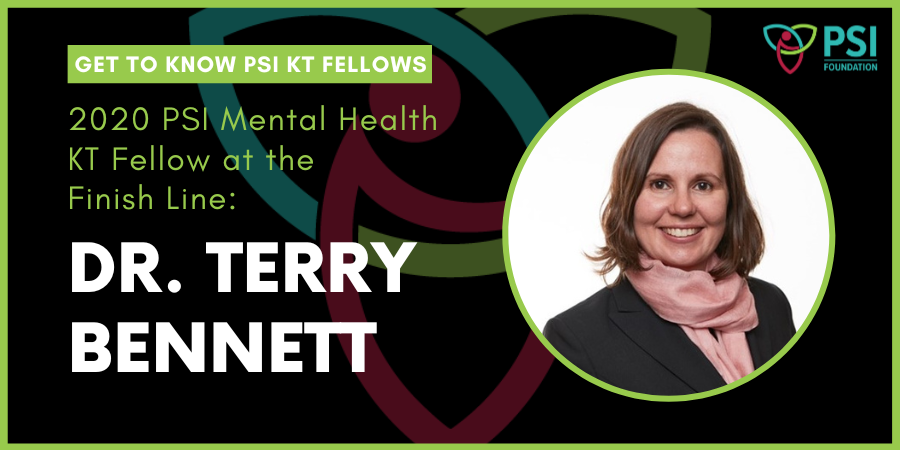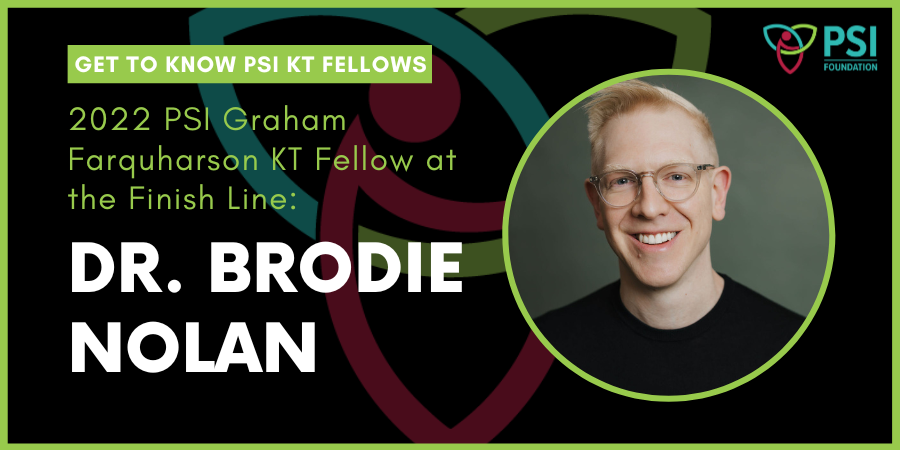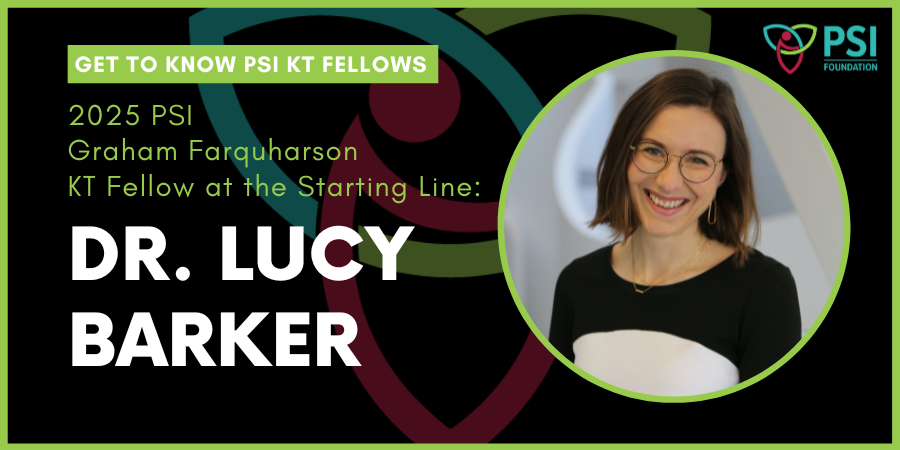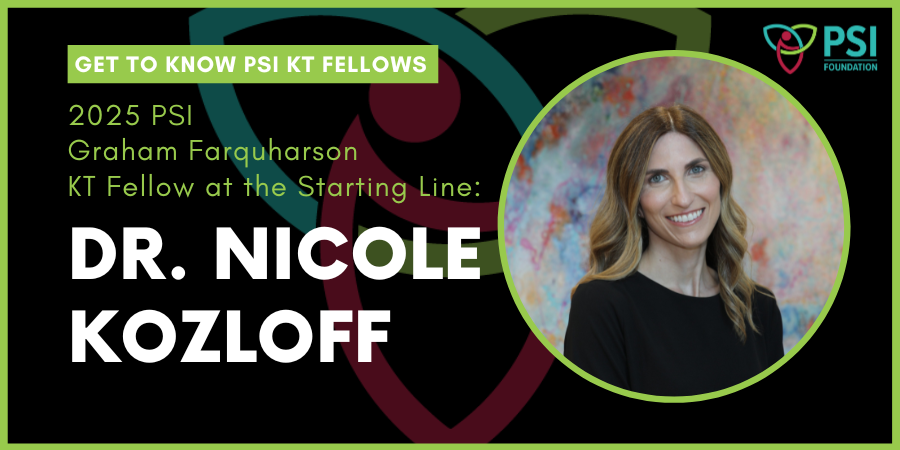After a few years of tirelessly working towards their research program and knowledge translation (KT) activities, our PSI KT Fellows reach the finish line of their fellowship. As they cross the end point towards their award, we asked our fellows for reflections on their journey to share their highlights from the fellowship and advice for other aspiring or current KT Fellows.
What are the key accomplishments and outcomes from your award?
First off, I’m so grateful to the PSI Foundation, reviewers and staff for this award. It allowed me the protected time to complete several foundational steps in my research program, focused on targeted child mental health prevention and family-centered care. These include publishing the results of our randomized controlled trial of the “Family Check-Up®” (FCU) in 204 families of young children at high risk of mental health challenges by virtue of early-onset emotional dysregulation and/or several psychosocial risk factors. This was the first trial of this brief, evidence-based, targeted child mental health prevention program in Canada. We demonstrated significant reductions in child emotional and behaviour problems 12 months after baseline. We have also adapted the program for delivery within an Ontario Autism Service setting and successfully completed a hybrid implementation-effectiveness randomized controlled trial including 82 families of Autistic children and youth, with analyses underway.
This award also enabled me to develop key partnerships with community agencies, school boards, child protection services and shelters – from which we were able to recruit underserved families. We have since build on this work by developing a sustainable team of research and clinical Family Check-Up® coaches and embedded the program during a pilot study within early childcare settings in high-needs Hamilton neighbourhoods (https://www.hamiltonhealthsciences.ca/share/family-check-up-partners-with-local-day-care/). Next steps include integrating the FCU within a larger-scale system of universal and targeted prevention, including supportive and sustainable methods of identifying families who may benefit the most.
I have also been fortunate to benefit from the mentorship of Dr. Daniel Shaw, one of the world’s leading experts in long-term outcomes (>20 years) of targeted early childhood prevention programs and a co-developer of the FCU. Our team represents Canada on the International FCU Governing Council, together with the U.S., Netherlands and Sweden and we successfully hosted the biennial international retreat last year with over 100 delegates visiting McMaster University and Hamilton. Our next step is to create a Canadian Centre for training and innovation in child mental health prevention, building on these experiences.
What are some lessons learned during the KT Fellowship?
I learned that knowledge translation takes time! In my line of work, translating findings from observational and clinical trials research into sustainable psychosocial programs requires building a lot of trust with communities, agencies and families. Partners sometimes feel like they have given to research endeavours without receiving a lot in return, so taking the time to hear about their needs, integrate their expertise and collaboratively build programs and systems is essential. The time taken is not always recognized by the usual productivity, or promotion and tenure, metrics, but it is meaningful, impactful and highly rewarding.
What was the most memorable moment(s) of this KT Fellowship?
This has been a deeply enriching few years, with many memorable moments.
These include – wrapping up our last of over 600 assessment visits in the community as part of our first randomized controlled trial, waiting with bated breath for our (blinded) analyst to reveal the study results, meeting our inspiring family advisory members who have shared so willingly their expertise. We were fortunate to learn from our generous colleagues at De Dwa Da Dehs Nye Aboriginal Health Centre about family-centered care through an Indigenous Lens. We have been inspired by the many people and agencies in our community who are committed to levelling the playing field for children and families who experience inequity. Finally, our team of clinicians, researchers and students have celebrated and supported each other as clinicians have become credentialed as certified Family Check-Up coaches, students have graduated, postdoctoral fellows have found faculty positions, and young adults have gotten married and started families of their own. It truly has been an experience of healthcare, innovation and knowledge translation through “fellowship” with others.
What are some general tips and advice you would give to those who are currently completing their KT Fellowship?
I found crafting the initial proposal to be such a helpful exercise in refining and communicating my vision for the change I wished to see through my research program, so having it ready to review was motivating and focusing.
At the same time, knowledge translation should involve “exchange” – so being open to learning from others and taking an iterative approach to knowledge translation is key.
Many activities and benchmarks related to knowledge translation – e.g., uptake of programs, training agencies, developing new clinical models – are not always recognized by traditional metrics of productivity within Academia, so try to find champions in your hospitals and communities who are willing to speak to the real-world impact of your work.
Finding a guiding implementation or knowledge translation framework to guide you – this helps organize a research program and set measurable benchmarks.
Don’t underestimate the value of “hallway chats” about what is NOT working in healthcare, what gets front-line clinicians and patients frustrated, what do they think we need? These were the inspiration for my research program, and these are often great litmus tests for your ideas about change.
Healthcare research and front-line work feel very challenging and under-resourced these days – find ways to build in celebration and support with your clinical and research colleagues. This work is hard, and clinician scientists are often pulled in many directions, so practise self-compassion.




